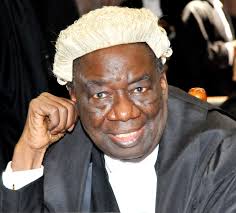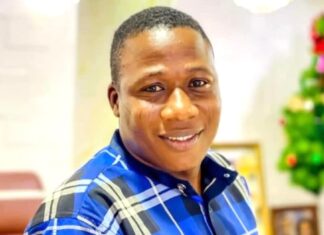Veteran politician, Richard Akinjide, a Senior Advocate of Nigeria (SAN), could be said to have seen it all in Nigerian politics and the law profession, having put in over 60 years in both engagements. He served as Federal Minister of Education in the First Republic and Attorney-General of the Federation and Minister of Justice in the Second Republic. In this interview with Assistant Editor, South West, MUYIWA OLALEYE, he speaks on Nigeria’s political and economic situations, bemoaning the country’s inability to control its oil resources, among other salient issues.
Nigeria is a country endowed with so many resources, yet grappling with serious economic difficulties. What do you think is the problem?
Nigeria knows little or nothing about oil and gas. By now, all our universities should have departments in oil and gas. If you have oil and gas and you do not control it, your economy is not in your hand. Nigeria’s economy is in the hands of foreigners.
The prices of oil and gas now dictate the state of our economy. There are oil and gas resources in Lake Chad. They now produce what they need and they do not rely on us. They supply oil and gas to the foreign countries. I will not be surprised if our own part of Lake Chad can produce plenty of oil and gas.
As regards oil and gas, Nigeria is in a hole and we continue digging. Angola is making better use of its oil and gas than Nigeria, but I hope they will not make the mistakes of Nigeria.
Nigeria’s oil and gas do not belong to Nigerians because the country collects rents on them.
We haven’t got oil. What we collect from our oil is rent because we lease out our oil and collect rent on it. The actual owners are the people that pay us the rent.
Our critical product before was agriculture. We must go back to that in a big way. We can once again make our economy thrive by investing more in agriculture. In the 1960s, agriculture largely dominated the Nigerian economy, as oil was progressively becoming an important source of government revenue. The Nigerian economy blossomed with agriculture. Let’s make agricultural sector competitive.
We should also go back to mining our solid minerals in Nigeria. Solid minerals have been abandoned since the oil boom. Nigeria is blessed with numerous solid minerals like coal, limestone, gold and silver, etc. Government and the private sector should invest in solid minerals and not just petroleum alone.
Though relatively young at the time, you were among Nigerians that saw the independence struggle actualised. At what point do you think Nigerians missed it?
Leadership is how you can control your intelligence during discussions among your contemporaries. At Independence, I was General Secretary of the National Council of Nigeria and the Cameroons (NCNC) for Western Nigeria. Naturally, I had to play an important role. Once a country got independence, it became a sovereign state and member of the United Nations. That was something we never experienced in life. But one thing that was upsetting on the Independence Day was that the niece of Queen Elizabeth was sent to give us independence paper at the ceremony. The Queen didn’t come; her husband and none of her children came. We discussed the incident among ourselves in the parliament. We were not happy because we thought that somebody more mature should have been sent to us and not a young niece of the Queen. But there was nothing we could do about it because I was the Speaker.
It was also realised at the time that many Yoruba decided to follow Obafemi Awolowo. Why was it so?
If you were really following the political situation at that time, you would discover that many Yoruba were in Action Group (AG) and NCNC. Awolowo, who was the leader of AG, had supporters among the Igbo and the North. Zik’s NCNC was also in alliance with the Northern Elements Progressive Union (NEPU) led by Aminu Kano, which was based in the North. So, you didn’t look at political party solely in terms of tribe at that time. All the political parties then tried to spread. Even for us, when our party was doing our rally in Ibadan, Tafawa Balewa came to campaign for us and it was great. So, the fact that the leader of a party came from a tribe does not make it an ethnic party.
You were also a prominent player in the Second Republic politics. What specific roles did you play during the period?
I was the Legal Adviser of the National Party of Nigeria (NPN) during the 1979 elections and I was involved in the 122/3 saga. I also handled the case of Shehu Shagari against Awolowo both at the tribunal and in the Supreme Court. So, I played a very important role during the election.
How did you bring about the 122/3 idea?
It was in the Constitution and the Electoral Act. It was just interpreting the law; it was a legal problem, not political problem. That was what I went to argue at the election tribunal and also argued in the Supreme Court and we won in the two courts.
Was that what earned you the position of Attorney-General of the Federation in Shagari’s government?
It is not for me to say that; it is Shagari who can say that. But I became the Attorney-General of the Federation.
How did you feel about the appointment?
I felt excited and delighted. It was the best office in government I would love to have; I got it and I was very happy. I enjoyed my tenure as Attorney-General. I represented Nigeria at the Law of the Sea Convention, which is the biggest convention sponsored by the United Nations. I signed the convention and the final act on behalf of Nigeria and it is now part of our laws. It is one of those contributions to history, which those of us who took part must be very proud.
How was your relationship with Awolowo after the 122/3 saga?
Excellent! He was a lawyer like me. He was much older than me in age, politics and governance, and he was a very good man. What I did in court was a legal problem; it was not a political problem. I did not write the judgment; the tribunal of three wrote the judgment and seven judges in the Supreme Court confirmed it by six to one. So, I was doing my job as a lawyer and the judges did their job as judges.
You have not been associated with the All Progressives Congress (APC), arguably the most dominant political outfit in the South West. Why don’t you like to play politics with your tribesmen?
When we were in government, we were the dominant party in the South West. When Ladoke Akintola was in government as Premier of Western Region, we were in the same party. So, it is not true that all the time I have always been in the other party other than the party that ruled the West. That is not true at all. When the military was at the helms of affairs, I was invited to become Commissioner for Finance in Ibadan; it was even announced in the media, but I declined. General Adeyinka Adebayo also invited me to serve in his government. Dr. Banjo and a bishop from Ekiti took me to him and he also offered me to come to his cabinet, but I also declined. I was invited to join a cabinet in Ibadan on two occasions and I declined.
How did politics leave you: you richer or poorer?
I will not say I am rich or poor, but I have always enjoyed politics. I practise law in Nigeria, Gambia and England. I am a member of the English Bar and I have also been in the International Law Commission of the UN in Geneva and also at The Hague, for Nigeria and Cameroon’s case (over Bakassi) for many years. So, I have enjoyed my political life very much and I have enjoyed my legal life also extremely well.
If you were not a legal practitioner, do you think you would have gone far in politics?
Certainly, but if you combine law with politics, it is a very good marriage. I enjoy both. If I had not been a lawyer, I would still have survived in politics, but I have made up my mind to be in politics and to also practise law, and now I combine both.













